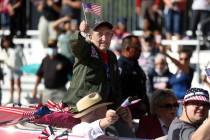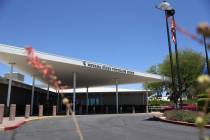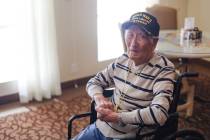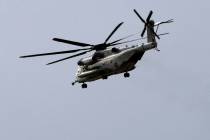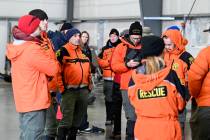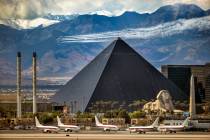Veterans share stories at Boulder City home
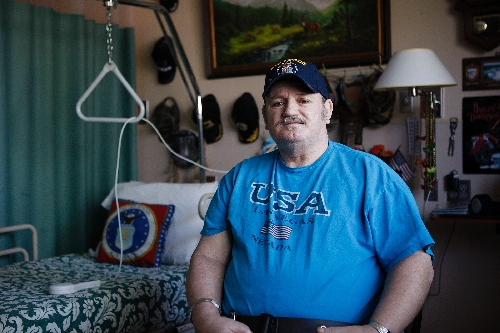
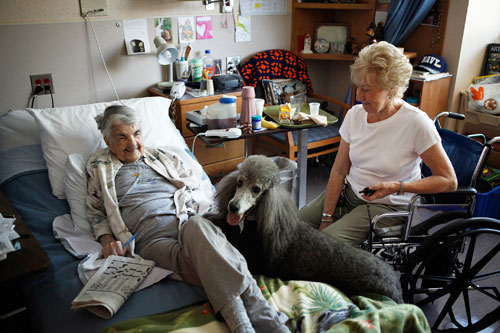
Phyllis Paxton decoded secret messages for the U.S. Navy during World War II. Tom Reese is an Army and Air Force veteran of World War II, the Korean War and the Vietnam War. Ron Womack printed security documents in the Air Force during the Vietnam War.
Each has stories to share while living at the Nevada State Veterans Home in Boulder City.
"These are wonderful people to be around," said Frank Bellinger, home administrator. "They are so proud of their service to the country and we are so proud to be looking after them."
Phyllis Paxton
Phyllis Paxton was born in 1920 in Grinnell, Iowa. After graduating from Grinnell College in 1942 with a journalism degree, she enlisted in the Navy and joined the WAVES (Women Accepted for Volunteer Emergency Service).
"I actually wanted to join the Women Army Corps and become a WAC," she remembered, "but my father said no because WACs had a bad reputation. And back then you listened to your parents."
Paxton was sent to Naval Reserve Midshipman School in Massachusetts and upon graduating as an ensign, was transferred to Washington, D.C., where she began her work as a decoding officer.
"I was on a large floor with all these sections and all these people and nobody knew what any other section was doing," she said. "The messages came in and we had to determine if it was a Japanese message. Once that was determined, we forwarded it to another section. I never read any secret Japanese messages and no one in that building ever discussed what we did."
Paxton left the Navy in 1948 as a lieutenant, but it wasn’t of her choosing.
"I was married and decided to make a career in the military, but I became pregnant," she said. "At the time, you couldn’t be in the Navy and have children. It’s different now."
Paxton has fond memories of her time in the Navy and Washington, D.C.
"No matter where you went in the city, military was everywhere and I respected all of them," she said. "There was a very positive attitude about the war. It was patriotic. I’ll never forget that."
Ron Womack
Ron Womack was born in 1949 in Norfolk, Va. He joined the Air Force in 1970, which turned into a 20-year career. In 1972, he was sent to Saigon, South Vietnam, where he was a printing press operator (technical sergeant).
"I was in charge of printing thousands of documents and had a staff of 11 locals assisting me," he said. "But locals weren’t allowed to print classified documents so I would do that myself, usually at the end of the regular work day or at night after they went home."
Womak realizes how good he had it compared to many of his Army and Marine buddies who were in combat.
"I was attached to administration and they were combat, but the camaraderie was wonderful," he said. "I saw a lot there and I’ll never forget. We won all the big battles in Vietnam but lost the war. Too much civilian involvement. I talk to guys who fought in World War II and they knew who their enemy was by the uniforms they wore. In Vietnam, in many cases, our enemy never wore a military uniform."
After Vietnam, Womak was stationed at other bases including Minot, N.D., where he was a facility manager of Minuteman III missiles. He retired and was working at Nellis Air Force Base when he had a stroke four years ago. He was moved around to different rehab centers before finding his way to the Nevada State Veterans Home. He loves it.
"This is the best," he said. "The food is excellent and I’ve put on weight. Everyone is caring and because of all the rehab, I’m able to move my right hand again."
Tom Reese
Thomas Alva Edison Reese was born in 1928 in Pennsylvania. He enlisted in the Army in 1944, went to basic training at Fort McClellan, Ala., was shipped to Germany, and then to Okinawa where, on his 17th birthday, he received his combat badge at the battle of Sugar Loaf Mountain.
After Okinawa, he was in Japan traveling through Hiroshima and Nagasaki after the atomic bomb had been dropped.
"Even now I remember what I saw and I never want to see it again," Reese said. "Everywhere I went it was a mess. Kids with their hands and faces burned. It was awful."
Reese, who has been at the veterans home since Gov. Kenny Guinn dedicated it in 1976, was assigned to the active reserves after the end of World War II. That didn’t last long because the Korean War came along and he returned to active duty – this time in the Air Force.
"It seems that every time I started something, I got orders to go somewhere else," he said. ‘I was in North Dakota during the Cold War building radar stations when the call came to move out in 72 hours for the Bay of Pigs in Cuba. Nothing happened, but I never stayed in one place very long."
Reese’s next war was Vietnam. He was there at the end helping South Vietnamese refugees leave Cam Ranh Bay. In 1976, after a 32-year career, Reese retired as a senior master sergeant.
As he thinks back over his time in the military, Reese said he would "do it all over again, only better."
Happy Birthday, Veterans HomeOn Aug. 12, the Nevada State Veterans Home will be 10 years old and the public is invited to the party.
As part of the celebration, the home is partnering with the Boulder City Chamber of Commerce for its 10th annual Open House on Aug. 22 from 4-7 p.m.
“This is extremely fitting because Boulder City has contributed to what our talented employees and volunteers have accomplished over the past 10 years,” said Frank Bellinger, administrator. “The city invited us to build the state’s first veterans home here 10 years ago and that was a wise decision. Our success would not be possible without community support.”
The 84,000-square-foot facility sits on 54 acres and can accommodate 180 residents. It is one of 140 state veterans’ homes across the United States providing skilled nursing services to veterans, their spouses and Gold Star parents. Its modern amenities, programs and full continuum of care have been recognized as being one of the best nursing homes in the country, including being placed in the Honor Roll of nursing homes by U.S. News and World Report.
The Nevada State Veterans Home is at 100 Veterans Memorial Drive. For more information, 332-6717 or veterans.nv.gov.









